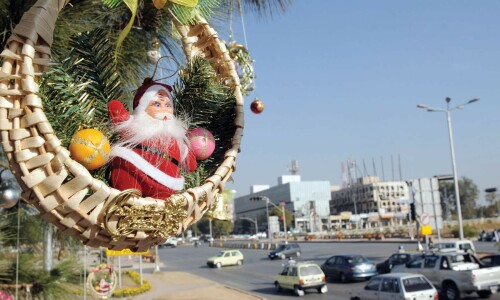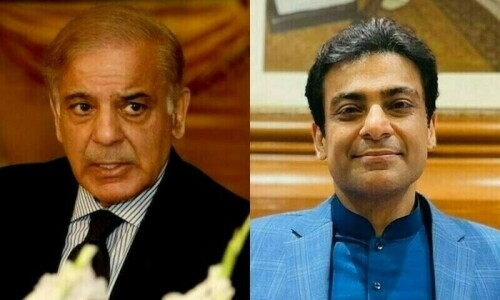COMMUNITIES across the Muslim world, particularly in South Asia and the Middle East, are familiar with the heartrending epic of Karbala, as the event is firmly embedded in the cultural consciousness, crossing sectarian and, in some cases, even religious lines.
Mention the word Karbala in these societies, and images of thirst, suffering and, most of all, the valiant stand of Imam Husain and his committed followers against a numerically superior Syrian/Kufi force immediately emerge. For centuries, depictions of this fateful battle have been heard from the pulpit and sorrowful verses recounted in noha and marsiya, as well as details mentioned in historical written accounts (maqatil).
Whoever hears and reads these accounts is struck by the barbarity unleashed upon the children and kinsmen of the Holy Prophet (PBUH) by the Umayyad forces. Yet, glimpses of that barbarity can be seen today, in a land only a few hundred kilometres from the burning desert of Karbala. That land is Gaza, and Israeli forces have, since Oct 7, 2023, unleashed atrocities on Palestine’s defenceless people not too different from the cruelty that was the hallmark of Yazid’s troops in Karbala.
Fourteen centuries ago, concepts such as protection of non-combatants and prevention of war crimes were nowhere near as well-defined as they are today. Yet, in this supposedly civilised era, those in sharp suits sitting in Tel Aviv have displayed the same disregard for human life and dignity that the Kufi and Syrian legions did on the day of Ashura in 61AH. Yazid may have perished, but the Yazidi ideology clearly survives.
There are similarities between Karbala and Gaza.
The similarities between seventh-century Karbala and 21st-century Gaza are uncanny. When Imam Husain’s small force, including women and children, arrived at Karbala on the second of Muharram, the Umayyad forces prevented them from getting water from nearby channels. By the time the day of Ashura arrived, the minor children were crying out due to unbearable thirst, yet the Umayyad generals refused the Imam access to water.
Similarly, Gaza has been under an almost airtight Israeli blockade since 2007, described as an open-air prison. After the Oct 7 events, the Israelis have tightened the blockade, using starvation as a weapon, bringing Gaza to the brink of famine. Seeing images of emaciated Palestinian children is unbearable for anyone with a soul. Clearly, the ‘only democracy in the Middle East’, as some describe Israel, is fine with using cruel seventh-century tactics to starve civilians into submission.
Moreover, women and children are supposed to be spared during combat. But in Karbala, the granddaughters and other female relatives of the Holy Prophet were meted out unspeakable treatment. In Nafasal Mahmum, one of the more authentic maqatil compiled by the venerable scholar Shaikh Abbas Qomi, it is written that: “...the ladies were drawn out of the tents and the tents were set on fire. The women of the Prophet’s family were bareheaded, bare-feet and marauded similar to the ones in captivity.”
The women of Gaza have had to endure similar treatment by the ‘world’s most moral army’. For example, even The New York Times has said that “nearly 60,000 pregnant women” are suffering from malnutrition, dehydration and other healthcare complications.
During the event of Karbala, the Umayyad forces showed no mercy, not even to children. For example, Hazrat Qasim, the son of Imam Hasan, who was barely in his teens, was martyred in a particularly barbaric fashion by the Umayyad hordes. Moreover, when Imam Husain was left alone in the field, another of Imam Hasan’s children, an infant named Abdullah, rushed to his beloved uncle’s defence, but was martyred in merciless fashion. And who can forget the youngest martyr of Karbala, Abdullah bin Husain, known as Ali Asghar. The suckling was attacked by a powerful arrow piercing his tiny neck while in the Imam’s arms.
In Gaza, thousands of children have been slaughtered by the Israelis, while thousands more have been left orphaned. Heartbreaking images of mothers wailing over their murdered children are enough to move even the most stone-hearted to tears.
Just as 14 centuries ago, the world watched as the grandson of the Holy Prophet and his family members were surrounded and martyred without mercy, similarly today, the global community silently watches the genocidal spectacle playing out in Gaza.
But despite their trials and seemingly unending grief, the people of Gaza can take solace from the example of Husain, who lived with dignity, and preferred to die than bow before oppressors. In one of his most famous sermons, Imam Husain emphatically declared “far be it that we accept humiliation”. Karbala teaches us that those who bravely resist oppression will live forever, while the oppressors will very soon meet an unedifying fate.
The writer is a member of staff.
Published in Dawn, July 17th, 2024













































Dear visitor, the comments section is undergoing an overhaul and will return soon.